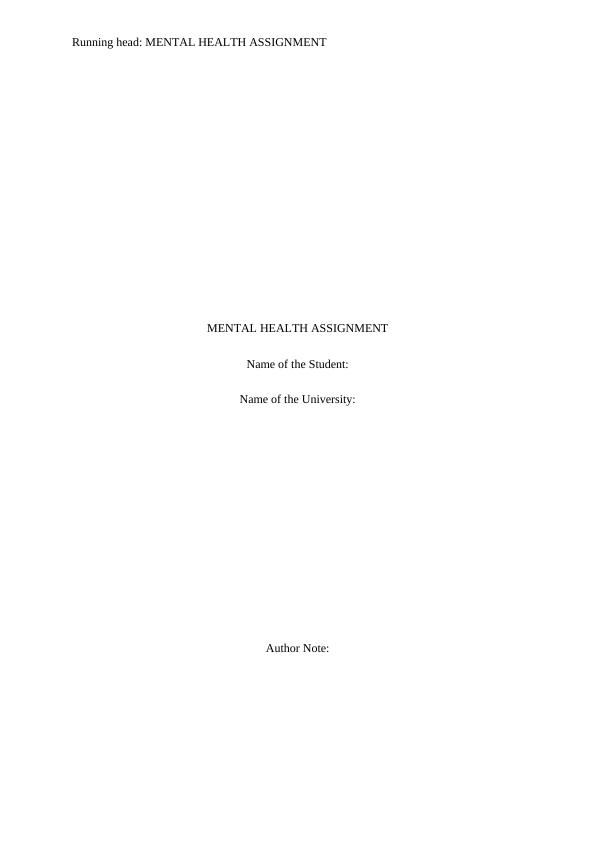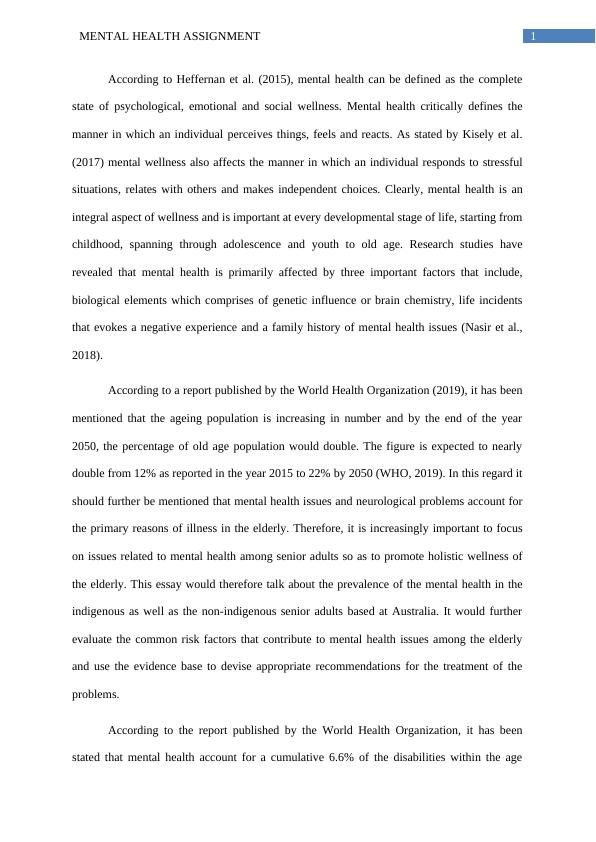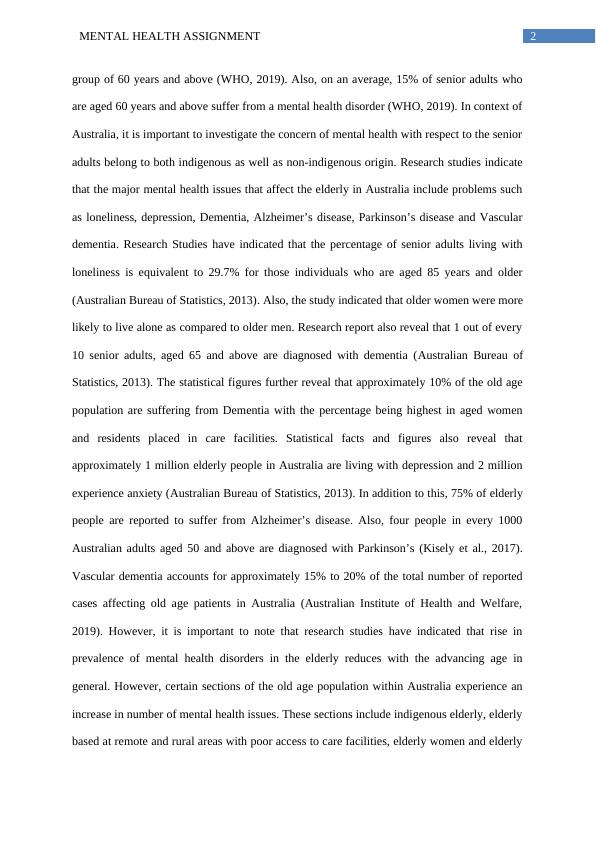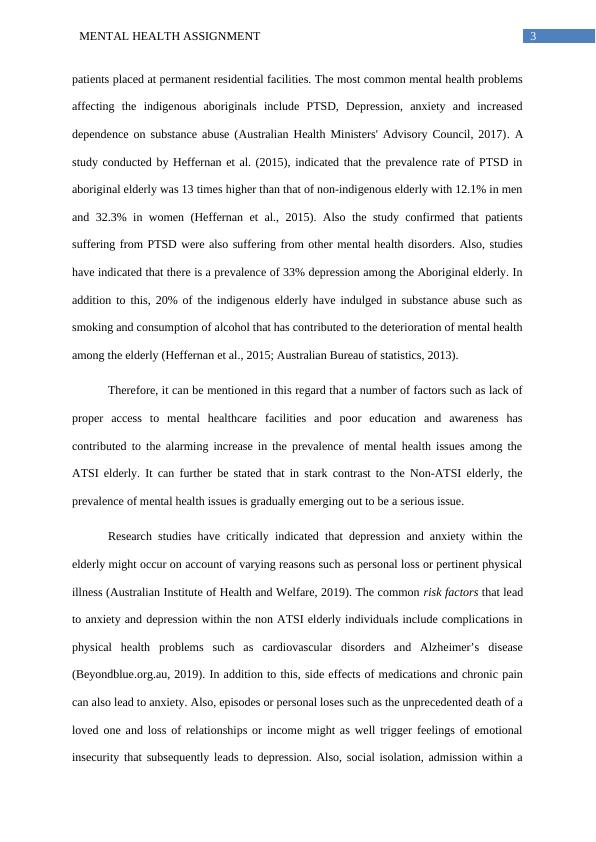Prevalence and Risk Factors of Mental Health Issues among Indigenous and Non-Indigenous Senior Adults in Australia
Added on 2023-05-28
12 Pages3708 Words467 Views
Running head: MENTAL HEALTH ASSIGNMENT
MENTAL HEALTH ASSIGNMENT
Name of the Student:
Name of the University:
Author Note:
MENTAL HEALTH ASSIGNMENT
Name of the Student:
Name of the University:
Author Note:

1MENTAL HEALTH ASSIGNMENT
According to Heffernan et al. (2015), mental health can be defined as the complete
state of psychological, emotional and social wellness. Mental health critically defines the
manner in which an individual perceives things, feels and reacts. As stated by Kisely et al.
(2017) mental wellness also affects the manner in which an individual responds to stressful
situations, relates with others and makes independent choices. Clearly, mental health is an
integral aspect of wellness and is important at every developmental stage of life, starting from
childhood, spanning through adolescence and youth to old age. Research studies have
revealed that mental health is primarily affected by three important factors that include,
biological elements which comprises of genetic influence or brain chemistry, life incidents
that evokes a negative experience and a family history of mental health issues (Nasir et al.,
2018).
According to a report published by the World Health Organization (2019), it has been
mentioned that the ageing population is increasing in number and by the end of the year
2050, the percentage of old age population would double. The figure is expected to nearly
double from 12% as reported in the year 2015 to 22% by 2050 (WHO, 2019). In this regard it
should further be mentioned that mental health issues and neurological problems account for
the primary reasons of illness in the elderly. Therefore, it is increasingly important to focus
on issues related to mental health among senior adults so as to promote holistic wellness of
the elderly. This essay would therefore talk about the prevalence of the mental health in the
indigenous as well as the non-indigenous senior adults based at Australia. It would further
evaluate the common risk factors that contribute to mental health issues among the elderly
and use the evidence base to devise appropriate recommendations for the treatment of the
problems.
According to the report published by the World Health Organization, it has been
stated that mental health account for a cumulative 6.6% of the disabilities within the age
According to Heffernan et al. (2015), mental health can be defined as the complete
state of psychological, emotional and social wellness. Mental health critically defines the
manner in which an individual perceives things, feels and reacts. As stated by Kisely et al.
(2017) mental wellness also affects the manner in which an individual responds to stressful
situations, relates with others and makes independent choices. Clearly, mental health is an
integral aspect of wellness and is important at every developmental stage of life, starting from
childhood, spanning through adolescence and youth to old age. Research studies have
revealed that mental health is primarily affected by three important factors that include,
biological elements which comprises of genetic influence or brain chemistry, life incidents
that evokes a negative experience and a family history of mental health issues (Nasir et al.,
2018).
According to a report published by the World Health Organization (2019), it has been
mentioned that the ageing population is increasing in number and by the end of the year
2050, the percentage of old age population would double. The figure is expected to nearly
double from 12% as reported in the year 2015 to 22% by 2050 (WHO, 2019). In this regard it
should further be mentioned that mental health issues and neurological problems account for
the primary reasons of illness in the elderly. Therefore, it is increasingly important to focus
on issues related to mental health among senior adults so as to promote holistic wellness of
the elderly. This essay would therefore talk about the prevalence of the mental health in the
indigenous as well as the non-indigenous senior adults based at Australia. It would further
evaluate the common risk factors that contribute to mental health issues among the elderly
and use the evidence base to devise appropriate recommendations for the treatment of the
problems.
According to the report published by the World Health Organization, it has been
stated that mental health account for a cumulative 6.6% of the disabilities within the age

2MENTAL HEALTH ASSIGNMENT
group of 60 years and above (WHO, 2019). Also, on an average, 15% of senior adults who
are aged 60 years and above suffer from a mental health disorder (WHO, 2019). In context of
Australia, it is important to investigate the concern of mental health with respect to the senior
adults belong to both indigenous as well as non-indigenous origin. Research studies indicate
that the major mental health issues that affect the elderly in Australia include problems such
as loneliness, depression, Dementia, Alzheimer’s disease, Parkinson’s disease and Vascular
dementia. Research Studies have indicated that the percentage of senior adults living with
loneliness is equivalent to 29.7% for those individuals who are aged 85 years and older
(Australian Bureau of Statistics, 2013). Also, the study indicated that older women were more
likely to live alone as compared to older men. Research report also reveal that 1 out of every
10 senior adults, aged 65 and above are diagnosed with dementia (Australian Bureau of
Statistics, 2013). The statistical figures further reveal that approximately 10% of the old age
population are suffering from Dementia with the percentage being highest in aged women
and residents placed in care facilities. Statistical facts and figures also reveal that
approximately 1 million elderly people in Australia are living with depression and 2 million
experience anxiety (Australian Bureau of Statistics, 2013). In addition to this, 75% of elderly
people are reported to suffer from Alzheimer’s disease. Also, four people in every 1000
Australian adults aged 50 and above are diagnosed with Parkinson’s (Kisely et al., 2017).
Vascular dementia accounts for approximately 15% to 20% of the total number of reported
cases affecting old age patients in Australia (Australian Institute of Health and Welfare,
2019). However, it is important to note that research studies have indicated that rise in
prevalence of mental health disorders in the elderly reduces with the advancing age in
general. However, certain sections of the old age population within Australia experience an
increase in number of mental health issues. These sections include indigenous elderly, elderly
based at remote and rural areas with poor access to care facilities, elderly women and elderly
group of 60 years and above (WHO, 2019). Also, on an average, 15% of senior adults who
are aged 60 years and above suffer from a mental health disorder (WHO, 2019). In context of
Australia, it is important to investigate the concern of mental health with respect to the senior
adults belong to both indigenous as well as non-indigenous origin. Research studies indicate
that the major mental health issues that affect the elderly in Australia include problems such
as loneliness, depression, Dementia, Alzheimer’s disease, Parkinson’s disease and Vascular
dementia. Research Studies have indicated that the percentage of senior adults living with
loneliness is equivalent to 29.7% for those individuals who are aged 85 years and older
(Australian Bureau of Statistics, 2013). Also, the study indicated that older women were more
likely to live alone as compared to older men. Research report also reveal that 1 out of every
10 senior adults, aged 65 and above are diagnosed with dementia (Australian Bureau of
Statistics, 2013). The statistical figures further reveal that approximately 10% of the old age
population are suffering from Dementia with the percentage being highest in aged women
and residents placed in care facilities. Statistical facts and figures also reveal that
approximately 1 million elderly people in Australia are living with depression and 2 million
experience anxiety (Australian Bureau of Statistics, 2013). In addition to this, 75% of elderly
people are reported to suffer from Alzheimer’s disease. Also, four people in every 1000
Australian adults aged 50 and above are diagnosed with Parkinson’s (Kisely et al., 2017).
Vascular dementia accounts for approximately 15% to 20% of the total number of reported
cases affecting old age patients in Australia (Australian Institute of Health and Welfare,
2019). However, it is important to note that research studies have indicated that rise in
prevalence of mental health disorders in the elderly reduces with the advancing age in
general. However, certain sections of the old age population within Australia experience an
increase in number of mental health issues. These sections include indigenous elderly, elderly
based at remote and rural areas with poor access to care facilities, elderly women and elderly

3MENTAL HEALTH ASSIGNMENT
patients placed at permanent residential facilities. The most common mental health problems
affecting the indigenous aboriginals include PTSD, Depression, anxiety and increased
dependence on substance abuse (Australian Health Ministers' Advisory Council, 2017). A
study conducted by Heffernan et al. (2015), indicated that the prevalence rate of PTSD in
aboriginal elderly was 13 times higher than that of non-indigenous elderly with 12.1% in men
and 32.3% in women (Heffernan et al., 2015). Also the study confirmed that patients
suffering from PTSD were also suffering from other mental health disorders. Also, studies
have indicated that there is a prevalence of 33% depression among the Aboriginal elderly. In
addition to this, 20% of the indigenous elderly have indulged in substance abuse such as
smoking and consumption of alcohol that has contributed to the deterioration of mental health
among the elderly (Heffernan et al., 2015; Australian Bureau of statistics, 2013).
Therefore, it can be mentioned in this regard that a number of factors such as lack of
proper access to mental healthcare facilities and poor education and awareness has
contributed to the alarming increase in the prevalence of mental health issues among the
ATSI elderly. It can further be stated that in stark contrast to the Non-ATSI elderly, the
prevalence of mental health issues is gradually emerging out to be a serious issue.
Research studies have critically indicated that depression and anxiety within the
elderly might occur on account of varying reasons such as personal loss or pertinent physical
illness (Australian Institute of Health and Welfare, 2019). The common risk factors that lead
to anxiety and depression within the non ATSI elderly individuals include complications in
physical health problems such as cardiovascular disorders and Alzheimer’s disease
(Beyondblue.org.au, 2019). In addition to this, side effects of medications and chronic pain
can also lead to anxiety. Also, episodes or personal loses such as the unprecedented death of a
loved one and loss of relationships or income might as well trigger feelings of emotional
insecurity that subsequently leads to depression. Also, social isolation, admission within a
patients placed at permanent residential facilities. The most common mental health problems
affecting the indigenous aboriginals include PTSD, Depression, anxiety and increased
dependence on substance abuse (Australian Health Ministers' Advisory Council, 2017). A
study conducted by Heffernan et al. (2015), indicated that the prevalence rate of PTSD in
aboriginal elderly was 13 times higher than that of non-indigenous elderly with 12.1% in men
and 32.3% in women (Heffernan et al., 2015). Also the study confirmed that patients
suffering from PTSD were also suffering from other mental health disorders. Also, studies
have indicated that there is a prevalence of 33% depression among the Aboriginal elderly. In
addition to this, 20% of the indigenous elderly have indulged in substance abuse such as
smoking and consumption of alcohol that has contributed to the deterioration of mental health
among the elderly (Heffernan et al., 2015; Australian Bureau of statistics, 2013).
Therefore, it can be mentioned in this regard that a number of factors such as lack of
proper access to mental healthcare facilities and poor education and awareness has
contributed to the alarming increase in the prevalence of mental health issues among the
ATSI elderly. It can further be stated that in stark contrast to the Non-ATSI elderly, the
prevalence of mental health issues is gradually emerging out to be a serious issue.
Research studies have critically indicated that depression and anxiety within the
elderly might occur on account of varying reasons such as personal loss or pertinent physical
illness (Australian Institute of Health and Welfare, 2019). The common risk factors that lead
to anxiety and depression within the non ATSI elderly individuals include complications in
physical health problems such as cardiovascular disorders and Alzheimer’s disease
(Beyondblue.org.au, 2019). In addition to this, side effects of medications and chronic pain
can also lead to anxiety. Also, episodes or personal loses such as the unprecedented death of a
loved one and loss of relationships or income might as well trigger feelings of emotional
insecurity that subsequently leads to depression. Also, social isolation, admission within a

End of preview
Want to access all the pages? Upload your documents or become a member.
Related Documents
Depression Among Retirees and Senior Citizenslg...
|13
|3379
|77
Why is healthy ageing important to individuals?lg...
|4
|508
|363
Best Practices for Imparting Holistic Care to Dementia Patientslg...
|8
|2126
|80
Systematic Review And Meta Analysislg...
|17
|4310
|36
Health Issues Affecting the Elderlylg...
|10
|2521
|65
Aging Adults Living on the Streetlg...
|14
|3882
|392